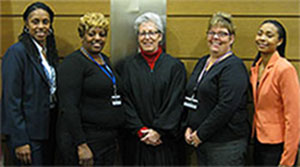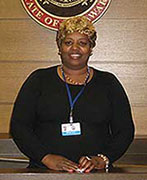Mental Health Court
Peer Mentor Program

In a significant enhancement of the Superior Court's Mental Health Court (MHC), a Peer Mentor Program was been added to the MHC team. The peer mentor program was launched in New Castle County Superior Court in January 2014.
The additional support of peer mentors is the result of the continued collaboration and outreach by the MHC team. Agencies involved in the peer mentor program include the Delaware Substance Abuse and Mental Health, (DHSS division) and the Mental Health Association in Delaware.
"Peer support is very important to individuals who are recovering from a mental health or substance use condition. Peers have experienced the same situation or illness as the people they are helping. They have been there and understand. They know what was helpful to them, and what was not, and they provide support and hope.
Director Huckshorn (DSAMH) was responsible for bringing peer programs to Delaware at the Delaware Psychiatric Center with statewide mental health providers in the community and now in Superior Court's MHC.
Healing begins by being with someone who understands. The peer specialists understand and are going to help many people achieve recovery. This is a wonderful example of collaboration between the division and the courts."
Why Peer Mentors?
Evidence-based best practices indicate that peer programs are a necessary component of the most successful mental health court programs. Judge Jan R. Jurden approached President Judge James T. Vaughn Jr. about the addition of peer mentors to the Superior Court MHC program; he was both receptive and supportive.
"There are 10 basic components of a successful mental health court - we now have all 10. I expect this last component will further improve our ability to assist justice-involved individuals with severe and persistent mental illness, while reducing recidivism and improving public safety," related Judge Jurden, "I am really excited about the peer mentor program and expect the [MHC] participants will find the peer mentoring tremendously helpful."
The peer mentor program began with an initial meeting that included Judge Jurden, Director Kevin Ann Huckshorn (DSAMH/DHSS), Director Jim Lafferty (MHA), Executive Director Dr. Joshua Thomas-Acker, (National Alliance on Mental Illness, Delaware), and Executive Director Drew Fennell (Criminal Justice Council).
The peer mentor 'architect' was really Director Huckshorn. She and Director Lafferty, whose organization runs several peer support groups throughout the state, made the peer mentor program happen, and quickly.
Director Huckshorn oversaw the selection of a coordinator, found funding for three peer mentors as well as interviewed applicants and trained the three new mentors. Of special note is that one of the three selected peer mentors is a successful graduate of our Mental Health Court.
What Do the Peer Mentors Do?
Peer mentors provide valuable assistance not only to the participants, but to the court as well. They began to meet with current MHC participants in January, and will meet with new participants as they enter the program.
They provide additional support, and help the participants navigate their way through their probation or diversion program. Mentors are an essential sounding board, and a source of support and encouragement. Most importantly, they have credibility with the participants because the peer mentors, at one point, each also struggled with and overcame the same types of issues and challenges.
Meet the Peer Mentors
"Peers are going to make a world of difference in the recovery of the clients within the Mental Health Court."

Hello, my name is Michele Owens.
I thought my life was over after my experience with the criminal justice system, but I found the strength to move forward.
This [opportunity] has been something that I have been praying for a long time, to help people advocate for themselves, and to engage themselves in crisis prevention and recovering for their issues and self-esteem.
I am now in the position to help them with community resources and to ensure the client that I am committed to their eventual independence. I am ready to commit to this job and program to do my best and give my all!
